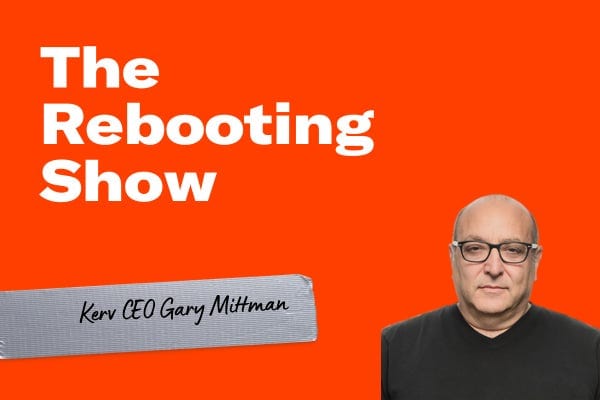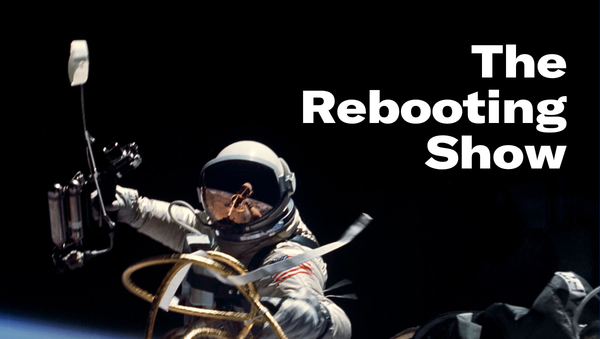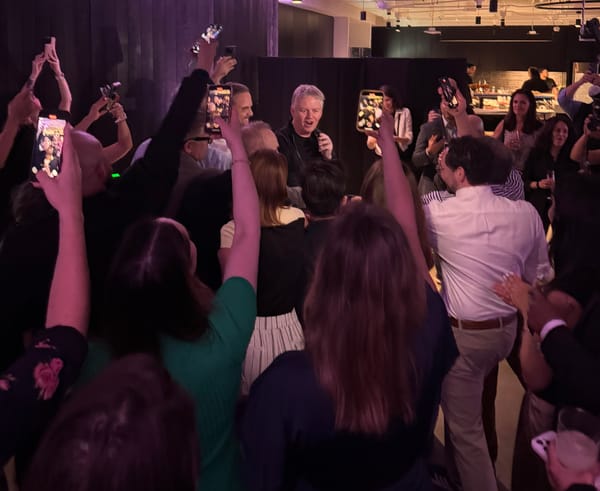Reforming advertising
"Let's talk about creating a better user experience within the ecosystem"

Thanks to Kerv for sponsoring The Rebooting and The New Attention Economy, our event in Cannes in under two weeks. We have a great lineup of top executives from GroupM, Roku, Vevo, The Athletic, Bloomberg, NBC Universal, Hearst, Havas, Human Ventures, Group Black, The Financial Times, Semafor, Puck, Samsung, Uber, Albertson’s and more.
Resetting advertising’s value exchange
Last week, I laid out why advertising will not be killed by AI, mostly because it is still a preferred option for most types of content vs subscriptions. An industry veteran sent a note last night that made the point perhaps more succinctly:
“People vote time and time again for free (things, content, media). Free has been the foundation for the digital landscape, broadly making things like Airbnb possible. There simply isn't enough stuff that people will subscribe to and it's naive to think that subscriptions or micropayments are the answer. There's a value exchange using free that advertising provides between marketers/publishers and consumers. Let's talk about creating a better user experience within the ecosystem rather than wishing for part of it to go away.”
The question is what will make a “better user experience within the ecosystem” that will reset the value exchange to be less adversarial and more trusted. I can think of a few broad principles:
More control. The rampant collection of data is being ended, as is normal, against the will of so-called ecosystem participants. Nobody likes rules, only without them, people see what they can get away with. Responsible use of data and AI is critical to regaining eroded trust. I find it hard to believe people want to be compensated for their data, or if it amounts to much, but I do believe transparency is coming, whether voluntary or involuntary.
Human-centered ads. Too much of advertising has treated people as bits rather than as humans. I’m not running The New York Times here, but I tell my sponsors the biggest drivers of success in the ads run on The Rebooting are whether they’re written in a human voice that matches the content and if there’s a real value exchange for interacting. The dark patterns of advertising, driven by an incrementalist culture of furious optimization, have long term costs.
More utility. There was a time when “branded utility” was thought of as the future of digital marketing: companies creating tools with enough value that people would find value and build loyalty with the company. That Web 2.0 fever dream gave way to hyper targeting because that’s more efficient (and it turns out effective, at least by the measurement systems and schema that exist). In this week’s episode of The Rebooting Show, Kerv CEO Gary Mittman explained how AI can now make shows shoppable, offering a glimpse of ad products that enhance programming.
More competition. Governments are awake to the lack of competition in many digital markets as network effects and scale have led to market concentration. For all people like to poke fun at crowded logo slides – I confess – vibrant competition is critical to reforming a market in which much of the value of a transaction is still gobbled up by middlemen. Few publications can rely on ads alone as a business model, but without a vibrant market, they have no shot.
How AI will change advertising

For more on how AI will change advertising, ideally for the better, check out this discussion I had with Kerv CEO Gary Mittman. Kerv’s tech is used to identify objects within video and match them to databases, enabling for, among other uses, the creation of interactive “shoppable video” that embeds commerce in entertainment. Some highlights:
AI will change the creative process forever. A lot of creative work, including advertising, is creating versions of the same essential piece of content. Even sequels to franchises will be affected, Gary said. Expect AI to be used to identify ad creatives in real time and “fix” the ads automatically. “This is another revolution, and we're at a precipice of the creation of something new,” he added.
Subscription fatigue. The land rush phase of the streaming wars is over. The pendulum is shifting from subscriptions to advertising. “People are not going to pay for 100 different channels at $5-$10 a month,” Gary said. “ It's just not going to happen.”
The “Jennifer Aniston’s sweater” moment. In ancient days – think 2005 – a staple of what were then called internet conferences was the idea that you’d be able to watch “Friends” and tap to buy a Jennifer Anniston sweater set. Much of the tech wasn’t ready, much less the consumer behavior, but that’s changing. “There's a long road of dead bodies to get here,” Gary said.
QR codes are changing behaviors. Of all the changes of the pandemic, the comeback of QR codes was among the least likely. Now, it’s the norm to see QR on TV ads, shifting consumer behavior. “The capability of having a one-click transaction off of television with your remote is where we're heading,” Gary said.
The Rebooting Show, Cannes Editions
In case you don’t know about all the events we’re doing in Cannes, I’m going to remind you a couple final times. If you’re heading to the Riviera, I hope you’ll join us at The New Attention Economy, presented by Kerv. During the event, I’m recording a series of live versions of The Rebooting Show podcast.
GroupM CEO Kirk McDonald and I will discuss why responsible media is necessary for sustainable media.
TikTok’s global head of operations for creator marketing Adrienne Lahens will join me to unpack the booming creator economy.
Hearst global CRO Lisa Howard and I are talking about how modernized legacy brands are faring far better than the digital upstarts that were supposed to take their place.
Bloomberg Media CRO Christine Cook is giving a hopeful outlook for the media industry in the midst of great change.
Puck COO and Semafor EIC Ben Smith will join me to discuss building media companies around individual “stars.”
And if that’s not enough, I’m doing a “cocktails and conversation” recording on Thursday, June 21, at the Dotdash villa, with Dotdash CEO Neil Vogel. We’re going to discuss AI mania, and I am guessing Neil will tell me much of the doom and gloom is overrated and will normalize. But we’ll see. Join us — there are snacks and drinks, too – on Thursday, June 21, from 4-6pm.
Noteworthy
Media shrunken: The travails at CNN belie an uncomfortable reality: The future of media is far smaller than it was in the past. Privileged perches are fewer and the talented and ambitious have other avenues. Witness the shift of Edward Enninful out of the editorship of British Vogue. "Being a glossy E.I.C., once a fantasy job, now no longer competes with the commercial opportunities afforded to styling ad campaigns and consulting brands,” Lauren Sherman notes. (Puck)
Monetizing taste: “It's hard to see a future for the lifestyle category of media outside of affiliate or real world “activations” like the Met Ball. Taste is always valuable. But increasingly difficult to monetize inside scaled media brands.” (People vs Algorithms)
Influencers quitting: All the way back in 2019, becoming an influencer outranked being an astronaut in career dreams of young people, leading to the predictable hand wringing. No need. Like most jobs, being an influencer is a lot of drudgery and often a fancy label for being a freelancer without health insurance or a 401(k). Adding that to the severe power law that exists on all platforms, and the sheen is coming off. The market often heals itself. (Vice)
The Air Mail exception: Graydon Carter’s newsletter version of Vanity Fair has “at least three suitors” to take a majority stake in the company, which has raised $32 million and is on pace to produce $15 million in revenue but still not be profitable. (NYT)
Boom, then bust: It seems like any promising niche of profitable media ends up getting over its skis. Spotify led a mini-boom in podcasting by splashing out big on Gimlet, The Ringer, Joe Rogan and other enablement companies as it dove into podcasting headlong. It is now pulling back, including a cuts of 200 employees in its podcasting division. (Variety)
AI vs clickbait: Like fake news, “clickbait” has become a catchall term to describe things a person doesn’t like. Tech people like to use the term promiscuously. Unsurprisingly, Instagram co-founders’ news app, Artifact, is applying AI to recast headlines its users have flagged as clickbait. This reminds me of the manual headline rewriting approach taken by Techmeme, which has mostly produced far more boring headlines. Artifact is already using AI to summarize articles, so you can imagine where this goes. (Medium)
Bring in the lawyers: Publishers are gearing up to fight AI companies to wring compensation for the use of their content to “train” AI models. Fair use is vague and open to interpretation – Japan, for instance, is saying AI models don’t violate copyright laws – which means lawyers should do quite well for themselves in the wrangling ahead. (Marketing Brew)
Passion pursuits: Graduation speech season always elicits debates over the hackneyed advice to students to “follow your passion.” That seems out of date in a world of rapid change and increased middle-class precariousness. Simon Kuper praises the vocational approach in which people focus on their specific craft as specialists vs the corporate path that invariably pulls people to becoming generalists who say things in meetings like, “Let’s double click on that.” (FT Weekend)
Lightly and with a smile: “To introduce myself, my name is Nick Cave and I am a singer who has somehow ended up with a website where I answer people’s questions. I have no idea how I arrived at this place, nor where this thing is going, but here I am waving to you across town, ‘lightly and with a smile’.” (The Red Hand Files)
Send me your feedback by hitting reply. Get in touch if you want to discuss sponsorship programs: brian@therebooting.com.




